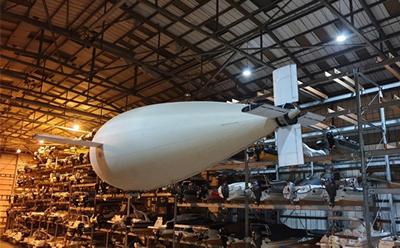Unmanned Phoenix pseudo-satellite rises for maiden flight

Engineers from the University of Southampton have powered a pioneering form of unmanned aerial vehicle (UAV) which has completed its first fully autonomous flight in Portsmouth.
The Phoenix ultra-long-endurance aeroplane uses the concept of variable-buoyancy propulsion that has been previously been explored in underwater engineering.
The 15m-long craft, which has been designed by experts from UK universities, companies and innovation centres, will be used in atmospheric satellite applications.
Professor Andrew Cruden, Head of Southampton’s Energy Technology Group, and Associate Professor Dr Richard Wills have guided the development of a solar-powered battery pack which powers the UAV’s pumps, valves and flight-control surfaces.
The prototype was flown over a distance of 120m at the Drystack facility in Trafalgar Wharf last month, concluding more than two years of collaborative design, manufacture, assembly and testing.
To read more please visit the full story of the Phoenix on our main website.